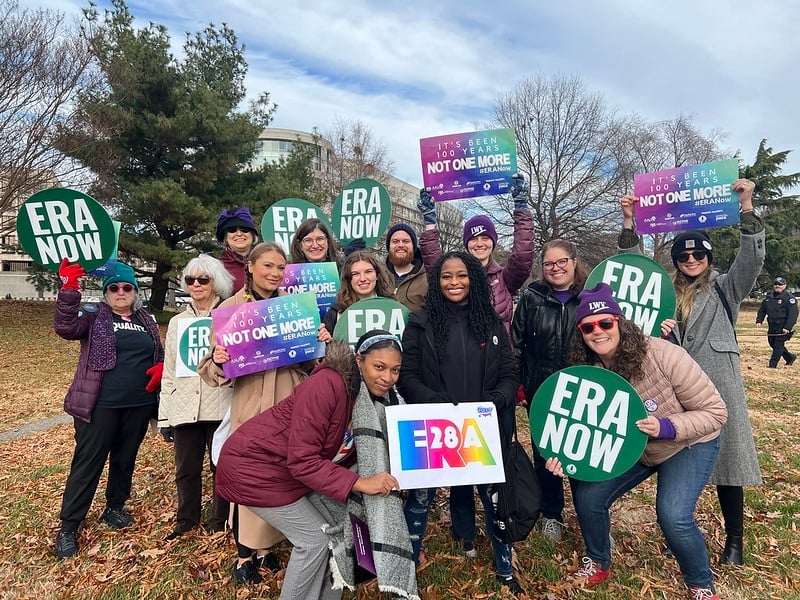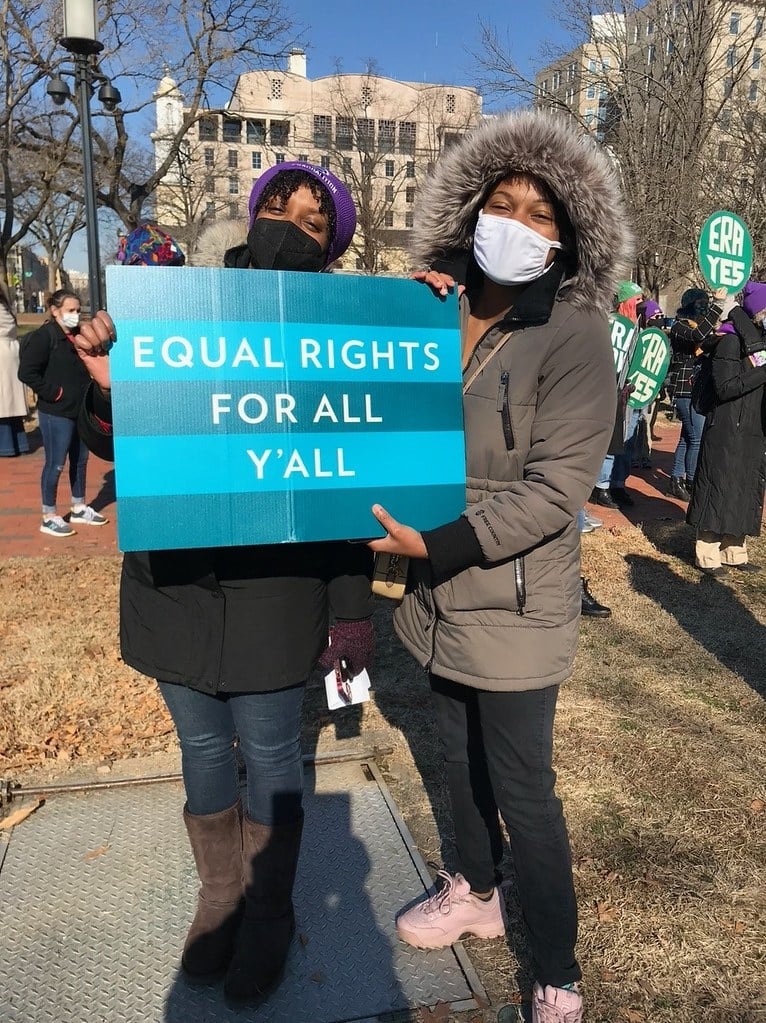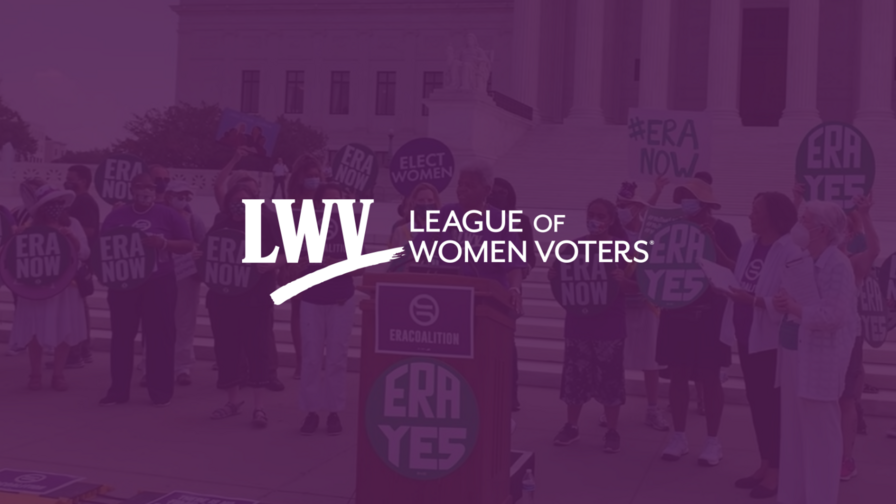The Equal Rights Amendment is the Law of the Land
The Equal Rights Amendment (ERA) is the 28th Amendment to the United States Constitution, which protects the equality of rights under the law regardless of sex. While the ERA is fully ratified and was recognized by a US President as the law of the land, it has yet to be officially published in the Constitution. Advocates were instrumental in achieving constitutional sex equality and will be instrumental in ensuring its enforcement. Today, we need the ERA printed in the Constitution where it rightfully belongs.
Add Your Name to Our ERA Petition
What is the Equal Rights Amendment?
The Equal Rights Amendment prohibits sex discrimination under federal and state law, stating “Equality of rights under the law shall not be denied or abridged by the United States or by any State on account of sex.”

Why Do We Need the ERA?
There are existing federal and state laws against different forms of sex discrimination, and the Equal Protection Clause of the Fourteenth Amendment to the Constitution prohibits government from denying equal protection under the law. Yet the US Supreme Court has not interpreted the Equal Protection Clause consistently to apply to sex in the same way it does to other protected classifications like race. This means that when people experience sex discrimination, they have limited legal protection.
As a result, women, girls, LGBTQIA+ people, and others continue to face discrimination on the basis of sex and gender. This is clear in ongoing fights against unequal pay, workplace harassment, pregnancy discrimination, domestic violence, limited access to comprehensive health care, discrimination against LGBTQIA+ individuals, and more. The ERA is a vital tool for the judicial branch to review claims of sex discrimination, protects against the rollback of equal rights, and paves the way for legislative progress toward equality.
How is the Constitution Amended?
The constitutional amendment process is established in Article V of the Constitution. Congress proposes an amendment, which it must pass with a two-thirds majority in both the Senate and the House of Representatives. Then the proposed amendment goes to the state legislatures, where three-fourths of the states (38 states) must ratify it. At that point, the amendment is a valid part of the Constitution. Following the fulfillment of the requirements of Article V, the national Archivist, who heads the National Archives and Records Administration, has a legal duty to certify the amendment and publish it.
Why Isn’t the ERA Published?
When Congress passed the ERA in 1972, it included in its proposing clause a seven-year time limit for its ratification. In 1978, Congress extended the time limit by three years, but by 1982, only 35 of the necessary 38 states had ratified the ERA. Over the years, some states have continued to work to ratify the amendment.

In 2017 and 2018, Nevada and Illinois, respectively, ratified the ERA. In 2020, with one state left to ratify, the Department of Justice’s Office of Legal Counsel (OLC), under President Trump, issued a memo saying that because all necessary states did not ratify the amendment before the timeline, it was no longer pending. When Virginia ratified the ERA later that month, the national Archivist did not certify it. In 2022, under President Biden, the OLC issued a new memo stating that Congress could act, or the judicial branch could consider the status of the ERA.
Imposing a time limit on the ratification of a constitutional amendment is a modern congressional addition, first seen in the twentieth century. However, as Article V establishes Congress’s power to propose a constitutional amendment with two-thirds of both chambers, but doesn’t give them the ability to impose a time limit on ratification, many legal scholars argue that a ratification time limit is unconstitutional.
Who Has Taken Action?
As the Constitution establishes in Article V, the ERA became part of the Constitution in 2020 when it met all ratification requirements. However, decades-long ERA opposition campaigns sowed doubt about the ERA’s validity. Additionally, various government actors punted responsibility: two presidents called on the OLC to determine the validity of the ERA; two national archivists deferred to the OLC memos and neglected their statutory duty to certify and publish the ERA; and President Biden called on Congress to act yet didn’t fulfill his constitutional responsibility to ensure that the Archivist followed the law.
To remove any doubt about the validity of the ERA and establish legal support if the ERA was ultimately challenged in court, many advocates and legal scholars have turned to Congress to act.
What Has the League Done to Move the ERA Forward?
Two consecutive Congresses introduced a joint resolution affirming that the ERA is a valid part of the Constitution. The House passed it twice in the 117th Congress (2021 – 2022), but the Senate didn’t bring it to a vote. In the 118th Congress (2023 – 2024), the Senate Judiciary Committee held a hearing on it, and Senator Schumer filed a motion to end debate on the resolution to take it to a vote. It received a bipartisan majority but fell short of the necessary 60 votes to overcome a filibuster.
In the 118th Congress, LWVUS submitted written testimony for the Senate hearing, sent letters to the Senate and House urging support, and maintained and promoted an action alert for people to contact their members of Congress, which generated more than 87,000 letters over two years. LWVUS, with sign-ons from all 50 state Leagues and the League of DC, sent a letter to Congress and the Administration to demonstrate nationwide support. Certification of the ERA has also been a cornerstone of the League’s “Women’s Inequality Day” campaign since its launch in 2022.
To get involved in our work around equality, search our 700+ state and local Leagues.
Following the 2024 election, LWVUS launched a campaign to urge President Biden to instruct National Archivist Colleen Shogan to certify and publish the fully ratified ERA in the Constitution.
The League authored an action alert generating 52,000 letters to the president and vice president’s office between November 2024 and January 2025. LWVUS co-authored a public letter to the President representing 143 diverse nonprofits, including legal associations and medical societies. The League also supported partners with virtual public education events, DC rallies, and in collecting more than 200,000 petition signatures that were delivered to the White House.
On January 17, 2025, President Biden released a historic White House statement affirming what we’ve known for years: the ERA is the 28th Amendment and the law of the land. Yet the Archivist did not certify and publish the ERA, so folks who oppose the amendment continue to argue against it.

As we celebrate the knowledge that equal rights are the law of the land, and the power of advocacy in spurring government action, we must inform others about our 28th Amendment and the importance of its recognition by our federal government. Every person in our nation deserves to see their humanity reflected and protected. Thus, we commit to continuing to fight for the promise of our democracy: equality and justice for all.
What Can You Do?
The League of Women Voters supports equal rights for all under state and federal law regardless of sex, gender, and other characteristics, and has advocated for ratification of the Equal Rights Amendment since the 1970s.
To take action at home:
- Sign our petition urging the federal government to recognize the ERA as the 28th Amendment
- Follow the League of Women Voters’ work on equal rights
- Join your local League to learn about and support efforts to protect and expand equal rights
- Talk about the ERA accurately with friends and family using resources like this blog!
The Latest from the League
The League of Women Voters of the United States and more than 140 diverse nonprofit organizations leading in women's, reproductive, LGBTQIA+, civil, and human rights sent a letter to President Biden calling on him to instruct the US Archivist to certify and publish the duly ratified Equal Rights Amendment (ERA) in the US Constitution.
The League of Women Voters of the United States and League chapters from all 50 states and the District of Columbia sent a letter to members of Congress and the Administration urging action for the immediate publication of the Equal Rights Amendment (ERA) in the US Constitution.
The Tony Award-winning musical Suffs depicts heroes of the suffrage movement — including LWV founder Carrie Chapman Catt — fighting for women’s right to vote in the early twentieth century.
We discuss the ways this musical relates to women's activism from the early twentieth century to today.
Sign Up For Email
Keep up with the League. Receive emails to your inbox!
Donate to support our work
to empower voters and defend democracy.





